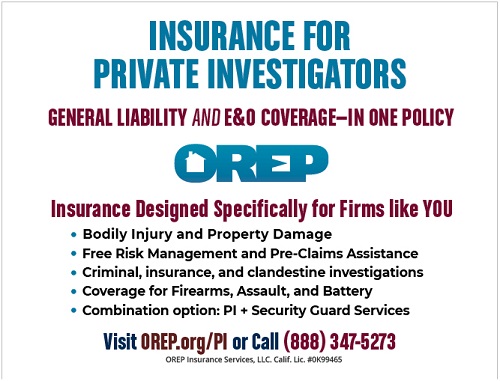By Kendra Budd, Editor
There is currently a very sensational lawsuit playing out in a Georgia court that private investigators (PIs) everywhere may find of interest.
This case has it all!
A hard-charging personal injury attorney, an aggrieved plaintiff who has been “severely” harmed by the actions of an insurance company, its defense lawyers, a private investigation firm, and five private investigators individually—and a demand for, you read that right, over 13 billion dollars.
While some observers may find the amount demanded to be over the top— this case is of particular interest to private investigators because it centers on a key liability exposure that PIs face on a regular basis in their line of work: the allegation of “invasion of privacy” and “trespass.”
PIs face this risk (legal exposure) across a variety of assignments—insurance fraud investigations, fidelity investigations, corporate investigations, workplace investigations, and more. The “investigated” party usually has every reason to get the evidence dismissed (if applicable), lash out at the PI, and even sue— if they can.
This case (Mezquital v. American Family Insurance et al) is a perfect example of how an investigation assignment can go very wrong (fast!) and result in serious litigation against the private investigator, their client, and their client’s client! But it is also instructive as a cautionary tale for PIs on what they can do, what they should avoid, and how they can protect their businesses and stay out of trouble.
Here’s the story.
Backstory
In late 2012, Luisa Cruz Mezquital was driving a minivan when a Jeep Wrangler swerved into her lane, hitting her vehicle head on. Her left, dominant hand suffered a degloving injury. There was a substantial loss of skin, muscle, and nerves—leaving her hand permanently disfigured and with a limited range of motion.
American Family Insurance (AmFam), the insurer for the driver of the Jeep Wrangler, misjudged the case. They declined to settle for the policy limits of $100,000 and ended up defending their insured in front of a jury where Cruz was awarded over $30 million for general damages and medical expenses in 2014. AmFam successfully appealed the $30 million verdict and over the next few years fought both Cruz and their own insured in court.

story continues
Initial Case Settled
After fighting to throw out the initial verdict and retry the case, the law firm representing AmFam—Baker, Donelson, Bearman, Caldwell and Berkowitz (Baker Donelson)—hired Martinelli Investigations, Inc. (Martinelli) to surveil Cruz; hoping to gather information they could use in their ongoing litigation.
After being engaged by Baker Donelson, the Martinelli private investigators began an incredibly intensive surveillance operation over a span of three weeks. Cruz ultimately discovered that Martinelli was surveilling her and immediately called an emergency hearing with the court—demanding that Baker Donelson produce the surveillance and make the Martinelli investigators available for depositions. After emergency depositions and a review of the videos and photographs, it became clear the PIs had routinely been on Cruz’s private property and put GPS trackers on her car while on her property. Cruz then successfully got much of the evidence Martinelli collected thrown out by the court.
On the eve of the retrial in late 2019, after years of litigation, AmFam settled the matter with Cruz for $11 million. The catch is that Cruz’s lawyer, Ben Brodhead of Brodhead Law, worded the “release of liability,” which Cruz signed as a condition of receiving the $11 million, in a way where Cruz did not release AmFam (or anyone) for any wrongs or damages related to the invasion of privacy or trespass claims she was planning to bring.
New Demand
The result of Brodhead’s clever release of liability is that on the same day that Cruz signed the release, Brodhead sent “preservation of evidence letters” to all parties related to the alleged unlawful surveillance. A year later, Brodhead sent a demand letter to AmFam demanding $50 million to “settle the claims of invasion of privacy and intentional infliction of emotional distress” related to Martinelli’s investigation tactics.
Trespass and Privacy Lawsuit
Cruz subsequently sued AmFam (the insurance company), Martinelli (the private investigation firm), and Baker Donelson (the law firm that hired the investigators), as well as five other private investigators who worked for Martinelli—alleging that all defendants committed crimes and intentional torts “with the specific intent, purpose, and result of causing severe emotional distress, fear, intimidation, and harm” to Cruz.
Cruz’s case rests heavily on the fact that the Martinelli investigators allegedly trespassed onto her property. This stems from the fact that Cruz’s home is accessible via a dirt road that continues on past her property but which is nonetheless included within her property lines. (See Figure 1 for an approximation of the property lines.)

The private investigators involved in the case admitted in their depositions that they had not reviewed the property lines for Cruz’s property and had assumed that the dirt road was not included in her property. They further assumed that the area of land on the other side of the dirt road opposite Cruz’s home was not her property.
These two assumptions turned out to be extremely detrimental to their investigation and are at the root of Cruz’s claims. Cruz argues that these allegations, if proven, “would establish that Martinelli committed multiple felonies.”
Outside of the offhand allegation that the PIs acted inappropriately by briefly surveilling Cruz’s 17-year-old son even when they knew she was not present, the core of Cruz’s lawsuit rests on the following facts:
1. The GPS trackers placed on Cruz’s vehicles were installed on her private property;
2. Martinelli investigators unlawfully trespassed onto Cruz’s property and installed a Spypoint Link-Dark “trail cam” on a tree located on her private property that could allegedly see into the windows of her residence; and
3. Martinelli investigators routinely ventured onto her private property to capture additional surveillance, swap out GPS tracker batteries, and retrieve SD cards from the trail cam.

story continues
It’s worth noting that in Georgia, unlike the majority of U.S. states, the use of GPS vehicle trackers by PIs is not illegal per se. Private investigators are allowed to use GPS vehicle trackers but they have to be installed when the vehicle is on public property. The fact that the PIs admitted to placing the trackers on the vehicles when they were located within Cruz’s property lines is what makes their actions problematic. Due to the amount of driving that Cruz was doing on a daily basis, the PIs ventured onto her property to swap out batteries on the GPS trackers multiple times during the three week investigation.
Cruz was able to effectively implicate both Baker Donelson and AmFam in the private investigators’ actions, in part, by discovering an email from a senior attorney at AmFam which was sent to the law firm with the following instruction for the PIs: “We need to have them do whatever they need to do to get a visual on her. Have them follow the van or do whatever else they can.” This suggests “direct involvement in a criminal scheme, not merely [a] passive role in hiring a subcontractor,” Cruz argues.
Trespass Claims
Cruz posits that the PIs trespassed on her real and personal property. In their initial depositions, the PIs attempted to justify their actions by pointing out that there were no posted “No Trespassing” signs, there were no signs that indicated entry was forbidden, and that no one confronted them or otherwise informed them that entry was forbidden.
Answering these defenses, a key distinction Cruz makes is that there is a difference between wandering onto someone’s property when going for a walk, for example, and entering someone’s property to surveil them, installing a trail cam pointed right at their house, installing GPS trackers on their vehicles (on their private property), and repeatedly returning to the private property for additional surveillance and to service said GPS trackers and a trail camera.
In this way, Cruz’s trespass claims go beyond the PIs merely entering the property, but extend to the placing of the GPS trackers on the vehicle and the other activities that occurred on her property. These actions were unlawful, and in the case of installing GPS trackers on private land, constitute felonies, according to Cruz. But aside from being criminal violations, these actions entitle Cruz to bring a civil claim—the argument goes. In February 2022, perhaps at the urging of Cruz’s counsel in an effort to bolster the “criminal” aspect of the case, the local county Sheriff’s office issued arrest warrants for three of the private investigators related to the alleged unlawful surveillance in this case.
Invasion of Privacy Claim
There is long established precedent in Georgia, as well as throughout much of the United States, that plaintiffs bringing a personal injury lawsuit necessarily expose themselves to scrutiny. For example, the Georgia Court of Appeals has held that “[by] making a claim for personal injury, [a plaintiff] must expect reasonably inquiry and investigation.” And that a plaintiff’s “right to privacy.. is waived by one who files an action for damages resulting from a tort to the extent of the defendant’s intervening right to investigate and ascertain for himself the true state of the injury.” AmFam, Baker Donelson, as well as the Martinelli defendants cite this case law to justify their actions.
However, Cruz’s answer is that there necessarily has to be a “bright line” on such activities. Specifically, a plaintiff making a personal injury claim doesn’t lose ALL rights to privacy—and even the courts have specified that investigations must be “reasonable.”
Cruz’s rebuttal reads: “For them, it is reasonable for investigators in a personal injury case to go onto someone’s property and install a camera and tracking devices that afford the defendant round-the-clock images and information that could not be gleaned from any public place. This argument invites sequential victimization of injured parties without any possibility of refuge. It is not reasonable to require injured parties to forfeit all property and privacy interests [emphasis added] to seek redress for their injuries. Baker Donelson’s argument to the contrary is radical and a marked departure from foundational norms of the civil justice system.”
Asking for Jury Trial
Cruz’s lawsuit was filed in July 2021 and so far, her case has survived multiple “Motions to Dismiss” filed by the defendants. For both the trespass and invasion of privacy claims, Cruz argues her claims deserve to be heard in front of a jury. New depositions of the private investigators and Cruz herself are now being scheduled in the Fall of 2022. With Cruz insisting on a jury trial, it will be interesting to see if this case will be tried publicly in front of a jury or if it will be settled for a confidential amount on the eve of the trial like Cruz’s last case.
A big part of Cruz’s $13 billion demand is based on her request for punitive damages from all defendants—including a demand from $12.2 billion for Am-Fam “to punish and to deter like or similar conduct.”
Lessons Learned
Isaac Peck, President of OREP Insurance, a national provider of liability insurance for private investigators nationwide, says that this case provides a good example of how things done “out of sight” often come to light. “PIs, especially those doing surveillance work, may assume that their actions or activities may never come to light—that nobody will ever ask questions. But as this case demonstrates, Cruz very quickly asked the judge for an emergency hearing and subpoenaed the PIs’ photographs and video, as well as called them in for depositions. Given the fact that the photos and video had already been turned in to the client (AmFam and Baker Donelson), even if the PIs had tried to conceal what they had done, it was unavoidable that Cruz would discover that they had trespassed on her property,” Peck points out.
Hal Humphreys, Director of Instruction at PIEducation.com and Executive Editor at Pursuit Magazine, was careful not to pass judgment when asked about the case. “It’s easy to look at a case after the fact—and hindsight is always 20/20. I wasn’t there and I want to be clear that I don’t think it’s fair for us to quarterback what was surely a difficult investigation,” Humphreys said.
Humphreys does offer some general advice for investigators as it relates to surveillance and being careful to avoid trespassing on private property. First, private investigators should always attempt to research property lines when they’re doing surveillance of a personal residence or are doing an investigation that might place them anywhere near private property. “In many cases, an investigator can go online and visit the county tax assessor’s website where the subject is located and pull up the subject’s property. In this particular case, the county assessor’s website actually shows a map that includes an aerial photo with property boundaries. It is available to the public and I didn’t have to login or register to pull it up,” says Humphreys.
So first and foremost, Humphreys recommends checking property lines. “It’s very easy to do and PIs doing surveillance work need to be mindful of it. This is especially true if you’re installing hidden cameras as part of your work, but can apply to regular surveillance jobs as well. The last thing you want is to be hit with a trespassing claim. I get heartburn about installing trail cameras on private property personally. If you’ve done the research on where the property line is, then you might be able to approach the neighbor and get permission to put a camera up. I’ve done that before and got the neighbor to send me an email granting me permission,” Humphreys says.
If you end up avoiding private property, then you might have to put something in a public right-of-way. “There are very reputable companies that can sell you cameras that look like utility boxes, fake locks, fake rocks, and so on. In my state, AT&T owns the telephone poles, so you need to be careful about that too. If you install a camera on that pole, you’re still installing it on AT&T’s private property. My personal rule is I don’t install cameras without getting permission,” Humphreys advises.
Being intimately familiar with the laws in your state is also key, according to Humphreys. “State laws can vary widely by state and GPS tracker placement is a great example of that. Depending on the type of work you’re doing, it might make sense to have an attorney you work with that you can put on some kind of retainer so they can give you legal advice. In some cases, I’ve even asked my attorney to write a letter citing case law so I’ve got some legal opinion on why it’s OK for me to do certain things, etc.,” Humphreys reports.
Lastly, Humphreys says this is an important reminder about the risks associated with the work. “My home state of Tennessee does not require PIs to carry liability insurance and many states are similar. But this is the perfect example of why I carry insurance. Even if these guys were 100 percent in the right and they win the case, they’ve been named in the lawsuit and it’s going to cost a lot to just defend it. Having insurance is absolutely key,” Humphreys argues.
>> Get a Fast Liability Insurance Quote (No-Obligation)
About the Author
Kendra Budd is the Editor of Working PI magazine and the Marketing Coordinator for OREP Insurance Services, offering customized professional and general liability insurance solutions to private investigators and security firms. She graduated with a BA in Theatre and English from Western Washington University, and with an MFA in Creative Writing from Full Sail University. She can be contacted at kendra@orep.org or (888) 347-5273.
We’re always listening: Send your story submission/idea to the Editor: kendra@orep.org.
About Working PI Magazine
Working PI is the most widely read print magazine for private investigators nationwide and is dedicated to providing the latest news, analysis, and information to private investigators across the United States. Led by experienced journalists and media professionals, and informed by YOU—the private investigators in the field. Working PI is published by OREP Insurance Services, LLC (OREP.org), providing insurance to professional service firms for over 20 years. Have a risk management or an insurance question? Give us a call at 888-347-5273.
>>> Private Investigator Insurance
Working PI provides industry-specific news for today’s informed investigation professional.






Strict adherence to the law is always a must. Property lines should’ve at least been checked prior to installing the stationary camera, as you really do not want to place something like that on any property that is not owned by a municipality or other government entity for public use. GPS usage is another subject entirely. And as far as setting up surveillance directly across the street, why don’t you just place a neon sign on your car that reads “PRIVATE INVESTIGATOR?”
True on all counts. But the goofs start prior to even hiring the P Is as this claim should have been settled for the policy limits.
Excellent article about the financial fallout from someone’s bad decision.
I agree!
What an outstanding article on a series of goofs by so many parties representing the carrier. Kendra Budd did an great job in presenting the necessary details. This is a must read by anyone assigned to defense work.
Kendra Budd did a great job in presenting all the necessary details in an articulate manner. This is definitely a must-read for anyone assigned to defense work.
Good article!